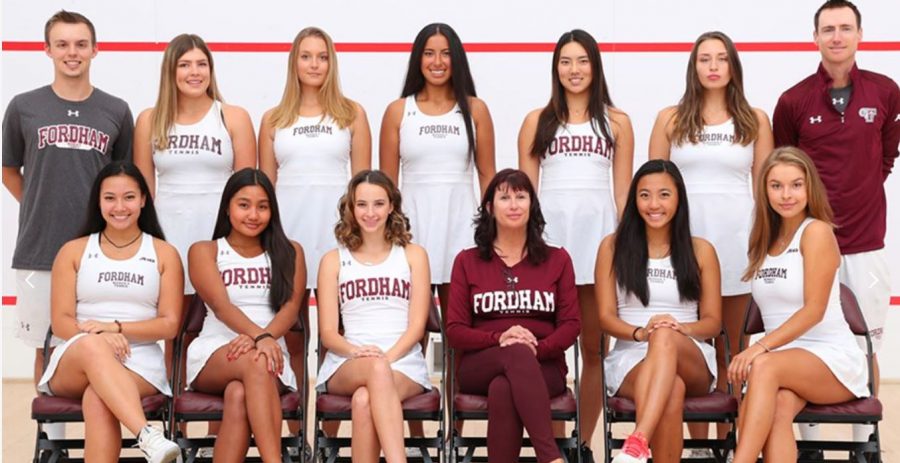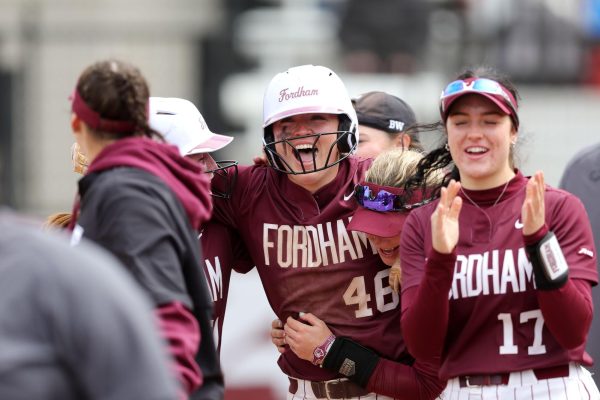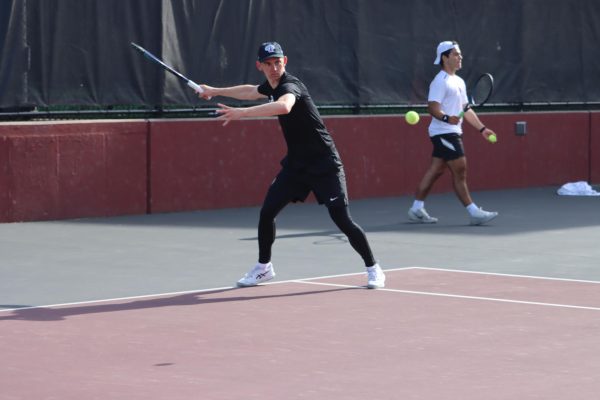Women’s Tennis Responds to COVID-19
The Fordham women’s tennis team (above) had its season abruptly cut short in March. (Courtesy of Fordham Athletics)
In early March of this year, the Fordham women’s tennis team was coming off of a win against Drexel, hoping it would propel the Rams into a successful trip to Florida and gear them up for Atlantic 10 play.
However, as most of the world came to a halt due to COVID-19, so did Fordham Athletics.
Coach Peter Banas said, “It was a surprise to get the season cut short, and a shock in general with COVID-19. We got an email on Thursday while I was packing my bags to go to Florida on Friday.”
The abrupt ending was all too common for spring season teams at Fordham, who had to halt their conference dreams for a year due to safety precautions.
Banas said the announcement caused reality to hit: “[COVID-19] is not just on TV, it’s on the tennis courts as well.”
The team was sent home, which was especially significant considering seven out of 11 players on the roster are international student-athletes. However, despite those unique circumstances, almost all of the team members were back on campus this semester to practice. Over the summer, the athletics department was hard at work, formulating rules, regulations and procedures to ensure a safe semester for everyone: athletes, coaches and people at and around Fordham.
Banas said the guidance from administration was straightforward and strict enough to guarantee a healthy practice environment: “Fordham Athletics provided the guidelines, step by step, even how many people are allowed in the locker room, on the courts, etc. We didn’t have to wonder how it had to be done because it was written out for us. We follow Ed [Kull], he is doing a tremendous job providing the guidelines.”
Although the women’s tennis squad is relatively small compared to other teams, it often has to share the courts with the men’s team and has had to shorten its practices to two hour slots with half the team practicing at a time.
Banas said that the group has adapted this to their advantage: “We split practice into two subgroups, since it used to be eight to 10 people at a time. Now, we are only allowed to have four people in the locker room. The quality has increased, so I can focus more on individuals, which would be the silver lining of this situation. I do have to be there for more hours, but I’m not complaining.”
Junior Rachelle Yang said that this modification has been noticeable. “The most significant change was the separate practices we had to hold in order to distance the girls,” she said.
For a team who is used to spending much of its time together, this has “made it more difficult to bond and encourage each other but we eventually adjusted to the practice schedule,” according to Yang.
For freshman Eleni Fasoula, this split practice time was even more difficult: “Since I was a freshman, this is something that was bothering me, because I didn’t have the chance to get to know my teammates game as well as I normally would and didn’t manage to interact with them at the court.”
However, Banas realizes how important perspective is in this ever-changing situation with actual games seemingly far down the line. “It is different to practice when there is a match, with girls more motivated,” he said. “We are looking forward to the spring and still find ourselves trying to be motivated for that.”
Yang agreed with this difficulty for determination, remembering that “getting the season cut short was really upsetting, especially since we’re not sure if we’re going to be able to have a season next spring. It makes it harder for us to be motivated to work since we don’t know what’s going to happen.”
Fasoula echoes this sentiment, noticing a considerable difference between playing in matches and practicing against her own teammates: “I usually use the previous matches to find my weaknesses and limitations, and not having any matches to look for feedback was making my practices more confusing, since I didn’t know where I should focus more.”
Although the team will be going home for more than two months, Banas said “We are doing our best to remind ourselves, even though there is no competition in two weeks or a month, we do have conference games coming in April. The matches are coming, we just have to be patient.”










































































































































































































